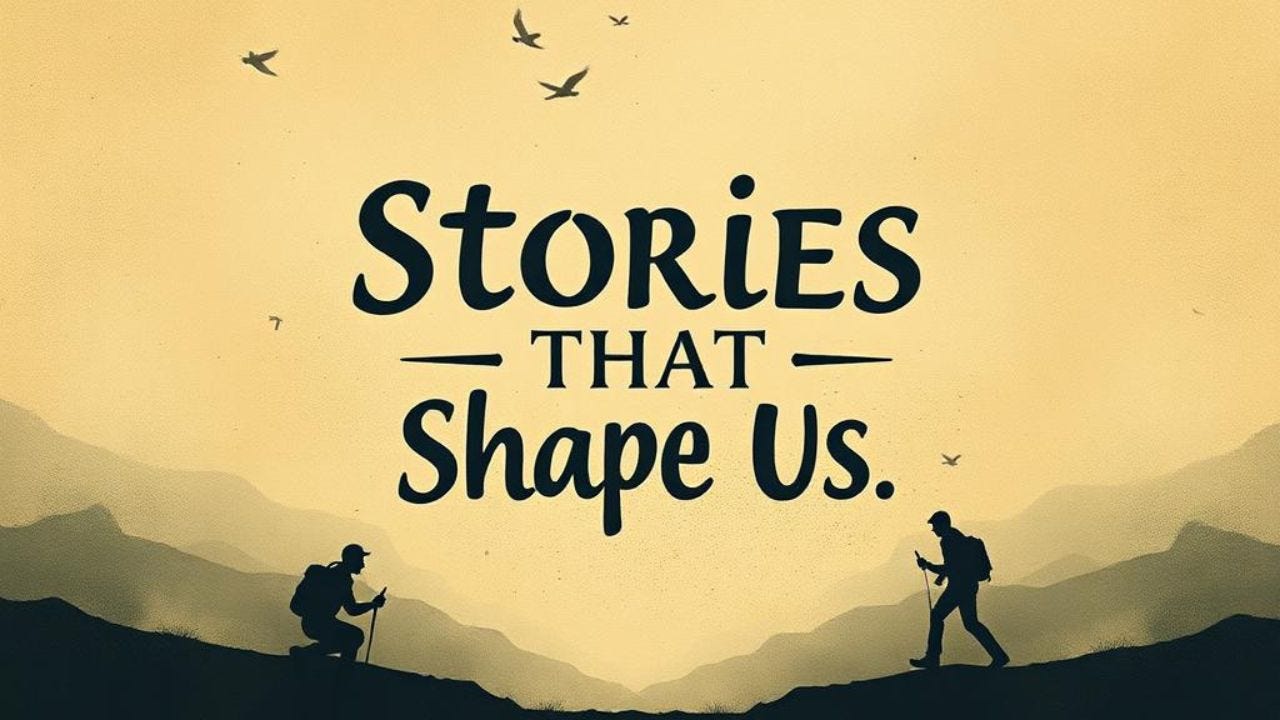Why Your Brain Thinks You’re the Villain
And How to Rewrite the Script
Have you ever noticed that your brain is basically Netflix on shuffle?
One minute, it’s playing an inspirational drama: “You’re destined for greatness!” The next, it’s a horror flick: “You sent that email to the wrong person, and now your career is over.” And sometimes it’s pure slapstick: “You just tripped in public. Again.”
Psychologists call this ongoing production your self-narrative. I call it the little screenwriter in your head who’s been working unpaid overtime since childhood and who apparently never went to film school.
The truth is, every one of us is living inside a story. Not the ones we post on Instagram, but the invisible stories that shape our identity, our choices, and even our sense of worth.
Why Stories Matter (Yes, Even the Embarrassing Ones)
Here’s the thing: the stories that shape us don’t just reflect reality. They create it.
If your inner story says, “I’m not enough,” you’ll find proof of inadequacy everywhere: in your boss’s critique, in your friend forgetting to text back, in that one sock that always goes missing in the dryer. (Seriously, where do they go?)
But if your story says, “I’m resilient. I’m growing,” then those same experiences become evidence of strength. The sock isn’t a tragedy; it’s proof that you can adapt. (And buy mismatched socks.)
Donald Miller, the bestselling author of Building a StoryBrand, told me, “If you confuse, you lose.” He was discussing businesses, but the same principle applies to life. If your story is cluttered with fear, comparison, or expectations you never chose, you lose clarity. And when you lose clarity, you lose direction.
That’s why getting clear on your story isn’t just nice self-help fluff. It’s survival.
Where Do These Stories Come From?
Ah, the origin story. Every superhero has one. So do you.
Maybe you were “the responsible one.” Maybe you were “the troublemaker.” Maybe you were “the kid who couldn’t catch a ball if it were the size of a beach balloon.” (That one’s mine.)
When I was in the Navy, my story for a long time was, “Don’t screw up.” It sounds motivating, but it actually made me more tentative. Every decision felt like walking a tightrope. Eventually, I realized: you can’t lead well if your story is just about avoiding mistakes.
Later, in the corporate world, my story became: “Blend in.” You laugh, but that’s easy to do in Fortune 50 boardrooms. Wear the right suit. Say the right words. Don’t challenge the playbook too much. But blending in almost erased me. It took years, and a few big risks, to realize that standing out, not fitting in, was the better story to live.
And here’s the kicker: even today, my podcasting story sometimes sounds like: “Technology hates me.” (Because yes, I’ve absolutely done the thing where you hit record, pour your soul out for an hour… and realize you never actually pressed record. Oops.)
The point is, we all carry scripts. Some serve us. Some don’t. And the good news is: we get to revise them.
Bo Eason, a former NFL player turned master storyteller, shared with me something I’ll never forget: “Your origin story is the most powerful thing you own. But you have to tell it truthfully or the world will tell it for you.”
And he’s right. Those early scripts still echo today. The question is whether you’re letting them define you or whether you’re choosing to reinterpret them.
The S.T.O.R.Y. Framework (Because Acronyms Make Everything More Official)
After years of studying how people live, lead, and sometimes crash spectacularly, I began to notice patterns in the stories we tell ourselves. Out of that came the S.T.O.R.Y. framework.
Enjoying this post?
This is where the free version ends, but I have more for you.
As a paid subscriber, you’ll unlock:
✅ The full companion workbook for this episode (The Stories That Shape Us)
✅ Ad-free listening links for the podcast
✅ Exclusive insights to help you live and lead more intentionally
If you’re ready to go deeper and rewrite the story you’re living by, join as a paid subscriber today.
It’s not a magic wand. But it is a way to decode your narrative and, more importantly, rewrite it.
S — Sense-Making
Your brain hates chaos, so it makes stories. That’s why a flat tire becomes “The universe hates me” instead of “I should’ve checked my air pressure.”
T — Truth
Not all stories are true. Some are distorted, some are inherited, and some are just bad reruns. Editing them back to the truth is what restores direction.
O — Origin
Your childhood scripts are still echoing. Question them. Rewrite them if they no longer serve you. (Yes, even if your fifth-grade teacher said you’d “never make it” — she was wrong.)
R — Resonance
Some stories pass through us. Others take root. They linger because they reflect something profound within us. Pay attention to what resonates. It’s usually pointing you toward what matters most.
Y — You
At some point, you’ve got to stop waiting for someone else to write the script. You’re not just a character. You’re the author. Grab the pen.
Putting It Into Practice (And Avoiding the Bad Sequels)
Okay, fine. This all sounds great. But how do you actually use it?
Here’s one exercise:
Pick one area of your life — work, health, or relationships.
Write down the story you’re currently telling yourself.
Run it through the S.T.O.R.Y. questions:
Does it make sense?
Is it true?
Where’s the origin?
Does it resonate?
And what role are you playing?
Because here’s the deal: your story isn’t fixed. It’s a draft. And you hold the pen.
Why This Matters
At its core, every story we tell ourselves answers two questions: Do I matter? Does what I do matter?
If your story says you’re invisible, you’ll interpret every missed call as proof. But if your story says you matter, that your presence, your choices, your voice count, you’ll live differently. You’ll take bolder steps. You’ll risk being seen.
That’s the heart of mattering. And it’s why rewriting your story isn’t just about clarity. It’s about reclaiming your worth.
Closing Scene (Cue the Credits)
So here’s my challenge: pick one story this week and rewrite it. Doesn’t have to be epic. It could be as simple as: “I’m bad with names” becomes “I’m learning to connect better with people.”
Because the stories that shape us are powerful. They can shrink us or set us free.
And remember, Netflix might cancel shows after one season. But your story? You’ve got unlimited renewals.
Listen to the full Ad-Free episode below.




